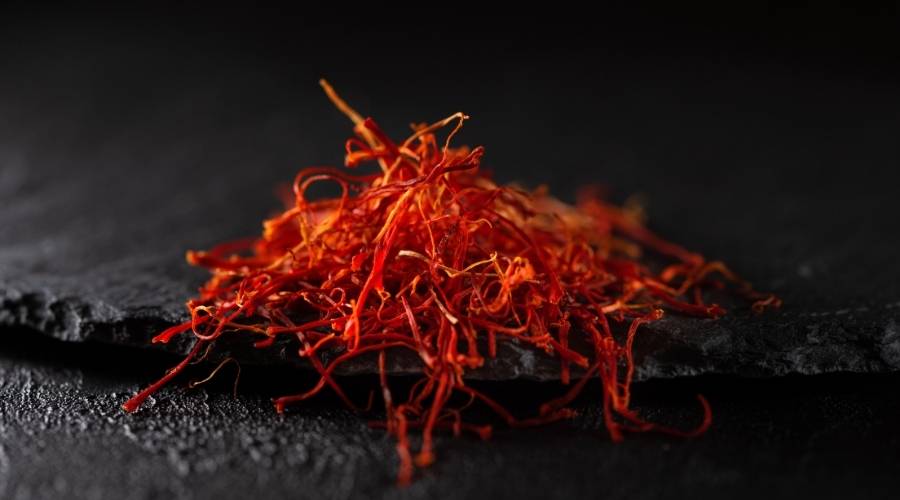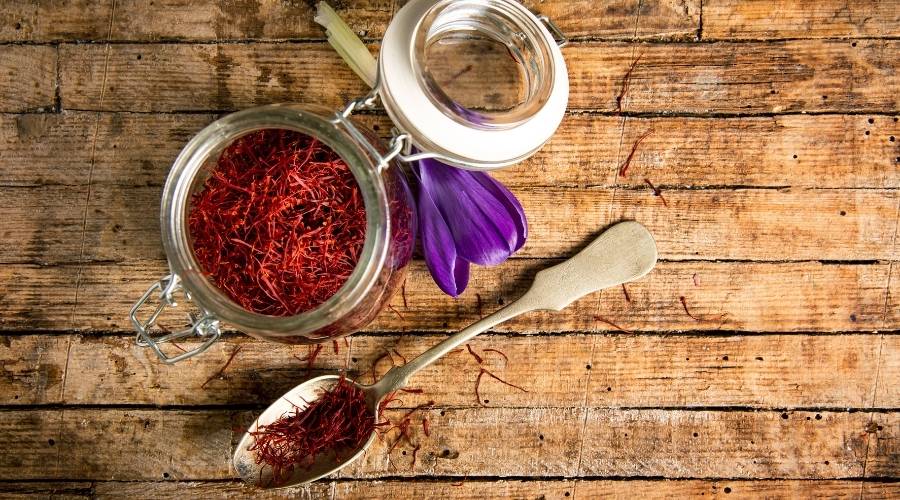Saffron is highly valued in Ayurveda, often referred to as the “king of spices.” This precious spice, also known as Kumkuma in Sanskrit, has been cherished for thousands of years and is mentioned in ancient Ayurvedic texts. It is not only admired for its vibrant color and fragrant aroma but also its remarkable healing abilities.
The benefits of saffron go beyond its use in cooking. In Ayurvedic medicine, saffron is classified as a tridoshic herb, meaning it can balance all three doshas—Vata, Pitta, and Kapha—in the body. This rare spice is known for its various therapeutic effects, including:
- Boosting digestion
- Purifying the blood
- Lifting mood
- Enhancing skin health
Saffron offers several advantages that contribute to overall well-being:
- Mood elevation: Saffron’s natural compounds gently soothe anxieties and lift emotional clouds.
- Vitality and rejuvenation: As a tonic, it renews vigor and fosters longevity.
- Restorative powers: Its golden threads are used in countless remedies to restore balance to mind, body, and soul.
The importance of saffron in Ayurvedic medicine goes beyond its scarcity or luxury status. It represents a promise of vitality and harmony—a priceless asset in traditional wellness practices.

The Origin and Cultural Significance of Saffron
The story of saffron begins with the delicate Crocus sativus flower, whose crimson stigmas yield the world’s most precious spice. Ancient civilizations in Persia, Greece, and Kashmir cultivated saffron for thousands of years, hand-harvesting each fragile thread in rituals filled with respect and artistry. This labor-intensive process—requiring roughly 75,000 blossoms for a single pound—has made saffron rare and magnificent.
Across the Mediterranean, saffron’s golden color and delicate fragrance are associated with celebrations and culinary excellence. Dishes such as Spanish paella, Italian Risotto alla Milanese, and French bouillabaisse owe their unmistakable warmth to saffron’s touch. In these cultures, saffron is not just a spice but a symbol of hospitality, good luck, and festivities.
Saffron in Middle Eastern dishes has been both a flavor enhancer and a cultural treasure throughout history. Persian rice pilafs, Moroccan tagines simmered with cinnamon and cumin, Persian tahdig crowned with its golden crust—all are elevated by the subtle yet profound note of saffron. Its use extends to desserts: baklava layered with aromatic syrup, Mahalabia pudding tinged with gold, and ice creams infused with its floral fragrance.
Saffron’s role goes beyond taste; it connects generations through shared recipes and rituals—each thread carrying echoes of ancient feasts and sacred traditions.
This lasting bond between spice and heritage helps us understand why saffron is so highly regarded in Ayurveda.
Saffron’s Healing Properties in Ayurveda
In the ancient practice of Ayurveda, saffron is known as Kumkuma and Kesar. It holds a special place among herbs and spices. What sets saffron apart is its ability to balance all three doshas—Vata, Pitta, and Kapha—no matter what your body type is.
How Saffron Balances the Doshas
Saffron’s gentle warmth calms Vata’s restlessness, cools the inflammation of Pitta, and energizes Kapha’s sluggishness. Unlike most herbs, which tend to favor one dosha over others, Kumkuma acts as a universal balancer. Its radiant energy is said to kindle Agni (digestive fire) without causing excess heat or dryness.
Saffron’s Versatile Uses in Ayurveda
Ayurveda recommends saffron for various imbalances:
- Vata: Calms anxiety, eases nervous tension.
- Pitta: Pacifies irritability, cools skin eruptions.
- Kapha: Stimulates circulation, dispels lethargy.
“Saffron brings sattva—the pure quality of clarity and joy—to the mind and body,” says the Charaka Samhita, an ancient Ayurvedic text.
The subtle power of Kesar can be found in various remedies such as drinks, tonics, and herbal pastes. Its golden strands are added to medicated ghee or mixed with rose water to enhance their rejuvenating effects. By restoring balance at every level—physical, emotional, and energetic—saffron represents the healing energy that lies at the core of Ayurvedic wisdom.
Health Benefits of Saffron in Ayurveda
Psychological and Emotional Benefits
Saffron’s vibrant threads are highly regarded in Ayurvedic medicine as a natural mood booster. Its reputation goes beyond being a culinary delight; it is known for its significant effect on emotional balance. Recent studies support this ancient belief, showing saffron’s impact on neurotransmitters—especially serotonin, the chemical messenger closely associated with happiness and calmness.
1. Mood Enhancement with Saffron
Ayurvedic practitioners often recommend saffron to relieve feelings of sadness, anxiety, and mild depression. Its gentle compounds uplift the spirit without causing harsh side effects.
2. Regulation of Neurotransmitters
Crocin and safranal, bioactive molecules found in saffron, help regulate dopamine and serotonin levels. This biochemical balance results in improved emotional resilience and mental clarity.
“The golden spice is not only a feast for the senses but also an elixir for the mind.”
In addition to its psychological benefits, saffron serves as a natural pain reliever—calming headaches and tension—and possesses anti-inflammatory properties that soothe nervous system unrest. In Ayurveda, these characteristics classify saffron as a powerful rasayana, or rejuvenator, promoting longevity while nourishing both mind and heart.
Its gentle warmth brings a sense of radiant tranquility to everyday life—a quality treasured by those seeking holistic wellness.
Reproductive Health Benefits
Saffron is renowned in Ayurveda for its aphrodisiac properties. This luxurious spice enhances libido by stimulating the senses and promoting a sense of well-being. The analgesic properties of saffron alleviate menstrual pain, making it beneficial for women suffering from dysmenorrhea. Moreover, its anti-inflammatory qualities help reduce uterine inflammation, aiding in the treatment of infertility and menstrual irregularities. As a Rasayana herb, saffron’s impact extends to regulating neurotransmitters like serotonin, thus uplifting mood and supporting reproductive health.
Skin and Hair Care Benefits
In Ayurveda, saffron is considered an herb that promotes overall health and well-being, making it a valuable addition to beauty and self-care routines. Here’s how saffron can benefit your skin and hair:
Benefits for Skin
- Soothes Irritation: Saffron’s analgesic and anti-inflammatory properties help calm irritated skin, making it effective for treating acne, redness, and blemishes.
- Enhances Complexion: The golden threads of saffron purify the skin, boosting its natural glow and giving you a radiant complexion that is highly valued in traditional medicine.
Benefits for Hair
- Nurtures Hair Follicles: Saffron’s powerful compounds nourish the hair roots, promoting healthy growth and strength.
- Protects Against Aging: The spice’s anti-aging effects extend to both the scalp and skin, protecting them from oxidative stress and preserving their youthful appearance.
Whether used in oils or masks, saffron holds the promise of revitalized skin and vibrant hair.
Eye Health and Urinary Tract Support
In Ayurveda, saffron is highly valued for its ability to relieve pain and reduce inflammation. As a rejuvenating herb, it provides powerful anti-aging benefits, including protecting retinal cells from degeneration. The beneficial compounds in saffron help protect eye health by reducing oxidative stress and enhancing vision.
Saffron also has properties that promote urine production, which is beneficial for maintaining a healthy urinary tract. Its natural ability to increase urine flow aids in the treatment of urinary disorders, ensuring a properly functioning excretory system. These diverse benefits highlight saffron’s important role in supporting overall well-being.

Traditional Uses of Saffron in Ayurvedic Treatments
Saffron’s versatility extends to its traditional uses in Ayurvedic treatments, offering both external and internal benefits.
External Use for Skincare Treatments
In Ayurveda, saffron is often incorporated into oils and pastes for skin applications. These formulations are renowned for addressing various skin concerns:
- Acne Relief: The anti-inflammatory properties of saffron help reduce redness and swelling associated with acne.
- Psoriasis Treatment: Saffron’s soothing nature aids in alleviating the symptoms of psoriasis, promoting healthier skin.
- Complexion Enhancement: Regular use of saffron-infused oils or pastes can lead to a more radiant and even-toned complexion.
Internal Usage for Health Benefits
Internally, saffron is a potent component in numerous medicinal formulations. Its applications include:
- Headache Relief: Saffron is known to reduce the frequency and intensity of headaches when consumed regularly.
- Joint Pain Alleviation: The anti-inflammatory effects extend to joint pain relief, making it a valuable remedy for arthritis.
- Digestive Issues Treatment: Saffron aids digestion by enhancing metabolism and reducing stomach discomforts such as bloating and gas.
These diverse uses highlight saffron’s integral role within Ayurvedic practices, showcasing its profound impact on holistic health.
Conclusion: Saffron—The Healing Fire of Ayurveda
Saffron in Ayurveda is highly regarded as the healing fire—a metaphor that represents both its golden color and its powerful ability to bring about change. The delicate crimson threads, harvested by hand, contain within them a vibrant energy that has been respected for centuries in various traditional medicine systems.
Symbol of Purity and Vitality
In ancient Ayurvedic texts, saffron (Kumkuma or Kesar) is praised not only for its ability to balance all three doshas—Vata, Pitta, and Kapha—but also for bringing clarity, warmth, and vitality to the body and mind. Its subtle heat signifies purification, burning away stagnation and awakening the body’s natural healing processes.
Cultural Significance
The bright color of saffron resembles the sacred flame in ancient rituals—its presence in food and medicine symbolizing good fortune and renewal. Each thread carries whispers of abundance, health, and strength.
“Saffron is the sun captured in a petal, dispelling darkness from body and mind.”
The lasting appeal of saffron in Ayurveda comes from its dual purpose: as a luxurious ingredient in cooking and a powerful remedy for healing. By incorporating saffron into our daily lives, we invite a spark of this healing fire—a symbol of vibrant health deeply rooted in tradition, culture, and holistic well-being.
FAQs (Frequently Asked Questions)
What is the significance of saffron in Ayurvedic medicine?
Saffron holds a vital place in Ayurvedic medicine due to its healing properties and tridoshic balancing effects. Known as Kumkuma or Kesar, it is valued for its ability to balance Vata, Pitta, and Kapha doshas, making it important in traditional medicine as a natural therapeutic agent.
How does saffron contribute to psychological and emotional well-being in Ayurveda?
In Ayurveda, saffron is recognized for its mood-enhancing qualities and its role in regulating neurotransmitters such as serotonin. This helps support mental health by improving mood and emotional well-being, making saffron beneficial for psychological balance.
What are the reproductive health benefits of saffron according to Ayurveda?
Saffron possesses analgesic and anti-inflammatory properties along with Rasayana benefits that make it effective in treating infertility and menstrual disorders. It acts as an aphrodisiac, enhancing libido and supporting reproductive health by alleviating pain and inflammation associated with these conditions.
How is saffron used for skin and hair care in Ayurvedic treatments?
Ayurveda utilizes saffron for skin purification, acne treatment, and complexion enhancement due to its anti-inflammatory and analgesic properties. Additionally, it nourishes hair follicles, promoting healthy hair growth, making it a valuable ingredient in skincare and hair care formulations like oils and pastes.
What are the benefits of saffron for eye health and urinary tract support in Ayurveda?
Saffron protects retinal cells against degeneration, supporting eye health through its antioxidant effects. Its diuretic properties aid urinary tract health by promoting fluid elimination, thus helping manage urinary disorders while providing anti-inflammatory benefits.
How is saffron traditionally applied in Ayurvedic treatments?
Traditionally, saffron is incorporated into medicinal oils and pastes for external application on the skin to treat conditions like acne and psoriasis. Internally, it is used to alleviate headaches, joint pain, and digestive issues, showcasing its versatile therapeutic applications within Ayurveda.





